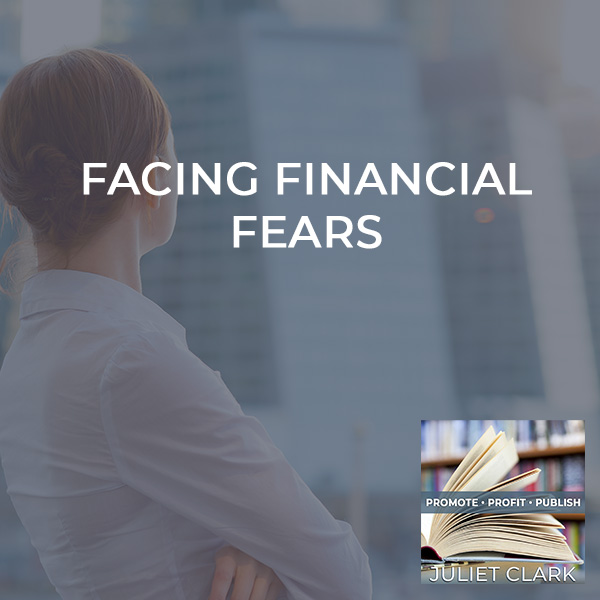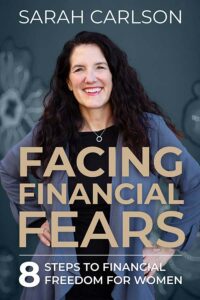
The journey to achieving financial freedom for women has many obstacles. Most of them stem from financial fears. Today’s guest helps demystify those fears with tips that will help you get closer to your financial goals. Sarah Carlson is a thought leader, writer, and financial planner. She is the Founder and Private Wealth Manager of Fulcrum Financial Group, LLC, and she’s also the creator of a financial empowerment business called Love Money Journal. In this episode, she joins Juliet Clark to discuss key concepts from her upcoming book, Facing Financial Fears: 8 Steps to Financial Freedom for Women. Tune in as Sarah shares mindset strategies and practical tips to help you build wealth.
—
Watch the episode here
Listen to the podcast here
Facing Financial Fears
8 Steps to Financial Freedom for Women
In this episode, we have another one of our terrific authors. We’re going to be talking to Sarah Carlson but before we get started, remember to go over to www.BreakthroughAuthorNewsletter.com and subscribe to our newsletter over on LinkedIn. We’re going to be running that ten-day challenge between October 17th and the 26th to help you folks build a better author platform.
I’m going to be followed up as well by a course that will be a one-day workshop and planning for 2023. Folks, the reason we’re doing this is every time we give a talk on author platform building, people sit there with their mouths wide open and their comments are, “There’s so much. I have so much work to do. I don’t know where to start. I don’t know what to do.” This is an important step to being able to understand what you need and to be able to break it down into bite-sized pieces. There are a lot of moving parts to building the platform so that you have a successful launch.
Sarah Carlson has the most intriguing book and it is aimed at women who need a little bit of help budgeting and investing and getting their finances in order. When Sarah did this, her plan was to help women of all ages but especially those that are 30s and 40s to get started early to be financially secure. One of the things that resonated with me was the beginning of the book, the introduction. We’ll talk about it a little bit more when Sarah’s on. It was something that I saw a lot when I was in the real estate world and divorces occurred.
We’ll get into that a little bit more, but Sarah Carlson is the thought leader, writer and financial planner and she helps nice people work towards the goal of living their very best lives. Although many people think that money can’t “buy” happiness, Sarah knows from experience that it certainly can help. With wealth often comes anxiety, especially for those who don’t know the ins and outs of financial planning, investment and money management.
There’s this funny thing I’m going to share before we get to the interview. Sarah and I were having this discussion. She was trying to understand something in the publishing world. I said, “Sarah, this is like you trying to explain to me financial planning and investments in a half hour.” We both laughed and moved on, but the seriousness of this is that it does take some time. It does take some learning and a commitment to be able to put all this together. I hope you enjoy this interview with Sarah.
—
Welcome, Sarah. It’s great to have you on the show.
Juliet, thank you so much for having me on the show. I’m excited to be here with you.
I’m excited to talk about facing financial fears because, first of all, we’re in a recession. We’re not in a recession. It depends on whom you ask. By our terms of in the past, we’re in a recession. I think people do have some financial fear going on.
You’re right. Financial issues create so much angst for so many people and 2022 in particular, in this market meltdown. It’s more of a mental meltdown. There’s a lot to be scared of. I know no one that does not have some element of fear now.
Financial issues create so much angst for so many people. Share on XThe first thing that struck me when I read your book is in the intro, there is this story or alluding to a story about real estate and when you get a divorce and how women fight so hard to get the house, then they can’t afford it. That story hit me. That was the first thing that came out for me because I used to sell real estate. I would see that all the time. Is this book mostly for women and helping them?
It is geared towards women. I have found, though, through my blogging and content, I’m surprised how relevant it is for men as well and how many men respond. It is, in particular, women. Many times are house proud and get so caught up in the emotion and the belonging in a house that they lose sight of the bigger picture and how it may be sabotaging other important things in their lives. It is such a common theme.
I think as women being nesters and being those nurturers to those people in our lives, our house so many times represents so much. Many times when women go through a transition, they fight hard to keep the house. As I outlined the story in the book, it can end up making everything difficult maintaining it, keeping it.
I’ve met so many women in particular that have, either through divorce or death, ended up with a house that then bankrupts them. They end up having to make tough decisions getting out of the house. That’s one of the things that I’ve helped a lot of women understand. Give them perspective as to how it fits into their life and maybe some other ways to think through their housing and how that’s going to help them get to their goals.
Part of that, what struck me about the story, too, I was involved when I sold houses in many divorces. You realize there are a lot of unrealistic expectations there. I remember going out to listing list a house and opt-in. I told the people that your house was worth $550,000. Each of them said, “No, we figured out what we need to go on with our lives. We each need $300,000.” I was like, “Okay. That’s amazing, but I don’t know where you’re going to get this other because the equity is not there.” You’re right. There are probably men in that position too. The other thing, too, with your Love Money Journal, part of this is that sometimes we forget what’s important in all of that.
Life is a process, a journey and your house should be providing shelter. It should be a safe place, someplace that you enjoy being. It should not be a piggy bank. It should not be robbing you of your retirement money, your emergency money. Many times people can lose sight. Not too long ago, I helped a woman whose husband passed away. They had used their house as a piggy bank. Not only did it have a second but third mortgage.
When he passed away, they had nothing in retirement. She had social security of about $38,000 and their house to maintain, it took over $50,000. She was a negative cashflow for keeping the house. She was forced to sell it at a deep discount. She ended up in her mid-60s having to go back to work because she had to after living this luxurious big house lifestyle. They didn’t save for their future.
Look what’s going on now. All over the internet, I see these, “Hurry and get a home line of credit before they don’t give them anymore.” Every time I pop on the computer, that pops up. They’re trying to get people to do that in the midst of all this inflation, which is the wrong thing to do. Talk a little bit about The Love Money Journal and when you’re working with people and how you see this helping.
Have some systems in place so you can be proactive and take the emotion out of those spending decisions. Share on XLove Money Journal is my financial empowerment business. Through that, producing the book Facing Financial Fears: Eight Steps to Financial Freedom for Women. Much about it is taking a systematic approach to your finances and the emotional piece. Your emotions can hurt your financial goals, but they can also help them if you get some organization behind it and tie your goals to thoughts that are important to you. The big thing is people don’t take action. What I mean by that is one step can change your trajectory. For example, one woman that I dealt with was a massage therapist. For years, she couldn’t say anything and she was hand to mouth and spent everything.
I encouraged her with each massage, put $5 in a box. It was about helping her change her behavior. It was amazing to watch it unfold. In a few months, she had saved $1,000 and more money. It was encouraging because she was putting $5 then suddenly she’s like, “I can do $10, $20, but I want to do this.” It changed her behavior. With that seed money, she was able to open a Roth IRA and do other things for her future.
What was great was then she inherited some money from her family, a modest amount, but by that time, she had changed her behavior. Instead of her spending all that money she got, it helped her create a cushion for retirement. She’s very comfortable now because she finally learned to live within her means and treat herself with respect. Much of saving and investing is about self-respect. We tend to treat everyone with more respect than ourselves, especially our bankers.
When you get into debt, whether it’s credit card debt or home equity line of credit, I love to call that the giant sucking sound because you’re on a treadmill. People don’t realize how much you’re paying and fees and everything else in order for the privilege to still pay that money. One of the exercises I like helping people calculate is how much per year they are spending on interest to have the privilege of still owing that money.

Financial Fears: So much of saving and investing is about self-respect.
To go and seek help, sometimes there’s a lot of embarrassment behind it. I went into Merrill Chandler’s program. I remember having my first consultation with him and having to fill out the paperwork. He’s like, “How are you going to get rid of all this debt?” I was so embarrassed, even when I was filling it out. Do you think that’s what holds a lot of people back?
There is so much shame and embarrassment. In fact, studies have shown that people have more shame and embarrassment going to a financial advisor and getting real about their money than they do getting naked in front of a doctor for the first time. Part of facing financial fears is helping the reader go from shame to joy through some curious steps. I want to demystify the money journey. I also want to normalize.
As women too, we tend to think of money as masculine and something that we shouldn’t talk about when I believe there’s nothing more feminine about knowing where your money is, having resources and peace of mind, knowing that you can take care of yourself and those loved ones. It all starts with getting real about where you are.
I’m so glad you had a chance to do that with Merrill to go through. Listing out your assets and liabilities is important. Many people have accounts all over. There are piecemeal and many times, they’re at an employer. Maybe they had a retirement plan and they moved. They lose track of them. One easy thing, I’ve had many clients find assets by going to their state’s lost assets site and looking for the name. Any state you’ve lived in, every name you’ve had, it’s worth checking out because everything from a rebate coupon to a retirement account that got detached from you gets turned over to these government agencies. It’s a free service the states do to help reunite you with your lost money.
Don’t spend money you don’t have. Share on XThat first step is gathering where is all your money at. That’s what we did with Merrill, too. Looking at where is the debt, getting over the shame of the debt and coming up with a plan. Here I am years later and I’m almost completely debt-free, which is amazing when I look at where I was. It was a behavior change because now, I don’t even carry my credit cards. If I see something, I have to come home and get it. Sometimes I’ll get home and I’ll go, “It’s not worth it.”
That is such a great hack. What you’re helping instead of getting caught up in the short-term rush of shopping therapy because we’re hardwired to seek out pleasure, looking for those emotional chemicals like serotonin when we shop. If you’re at risk of spending that way, having a strategy of keeping your credit cards at home, it’s proven you spend 30% less if you pay cash. Instead of pulling out your bank information, paying for cash, you significantly spend less. Have some systems in place so you can be proactive and take the emotion out of some of those spending decisions.
The other thing that’s important is the cashflow. We’ve all heard, “Live within your means.” Basically, don’t spend money you don’t have. How are you going to do that unless you know how much you have coming in? Every dollar you make, Uncle Sam takes a chunk of it. Ideally, you’re siphoning some off in probably a retirement plan that you have through your employer or on your own. You have a net amount, but understand what you have, your fixed and discretionary expenses. How much do you have control over your have to have expenses and your want to have expenses?
The more you can have an understanding on that, the better you’re going to be able to control those money purposes. The other thing is your money has different objectives. It’s reasonable to have a short-term, medium and long-term money. Your short-term money should be very safe like your emergency funds. Your medium-term money might be saving to buy for a new car. Maybe a new house or educating your kids. It’s reasonable to have a moderate investment plan with that. The long-term money, the money you’re going to need years from now, needs to be more opportunistic and statistically the best chance of growing.

Financial Fears: 98% of the time it comes down to behavior and people’s mindsets.
What are we going to get inside this book? What tips are we going to get? Where do you hope people go with this?
The book is designed to take the reader on a journey through stories and exercises. They think about their own situation. It’s designed to motivate them to take action. The reader is going to not only have come away with a better understanding of why they are now but also come up with a plan of where they want to go and feel comfortable with some action steps to get there.
For me, the motivator was I took my credit card statements and I separated the interest from the balances. When I saw how much I was wasting every year on interest, it was crazy. I was like, “Think of what you could do with this money.” That became my savings. Are there exercises like that? I don’t mean exactly that but are there things in that in the book that will aluminate and make you go, “Whoa?”
Yes, there are. There’s some and in this technical world we live in, there’s certainly lots of software that we suggest to the reader that can help. I also love some old-school hacks like the exercise you went through knowing the debt and calculating how expensive that debt is, even posting that in a place like your room or bathroom. Someplace that you’re going to see it regularly will help motivate and spur you to taking action to eliminate that debt. As with you, to take care of all that in two years is impressive.
Money should serve you and help you live your best life. It shouldn't keep you small, paralyzed, and limited. Share on XIf you knew how much it was, it’s very impressive. I’m going to put it out there because I don’t know if you’re as woo-woo as I am. It seemed like once I had a plan, the universe opened up and made that plan happen. Not only did I start attacking that debt, also, every single check I got in as an entrepreneur, 10% went into savings and all of a sudden, now I had emergency money. My debt was gone. It seemed like once I put it out there that this is what I was going to do, it started happening and very quickly, too. Very quickly, I saw results. Once you see results, then you get like, “I want more results.”
It doesn’t take a big step to start seeing some changes like you’ve seen. I’ve been in the financial industry for many years. I’m a certified financial planner. There’s nothing in the financial universe that I can’t help my clients with. I’m so amazed. After all these years, 98% of the time, it comes down to behavior and people’s mindsets. To your point, once you make a decision and you put some action behind it, you get momentum and you get a payoff to see how you’re reaching those goals. It’s contagious. Even though money can’t buy happiness, having a buffer and having financial options sure can put a smile on your face with the peace of mind that you have with that.
It can make you happy because here’s why. Once I got that savings going, if I had an unexpected disaster, I could say, “Thank you, universe. I have this to cover it.” It can make you happy in that sense to know that somebody’s got your back or you’ve got your own back there. What do you hope to do with this book? The Love Money Journal program, is that the next step from the book? How do you envision all of this with your next steps?
I wrote this book because I’ve been able to profoundly help a lot of people through my career but probably about 1,000 people. I view the content in this book is an opportunity for me to help so many more people. The next steps will be a workbook. Certainly, I want to continue to grow on it. This is the one to give lift. It certainly is an advocate of taking the steps as well as turning into a professional.

Financial Fears: Even though money can’t buy happiness, having a buffer and having financial options sure can put a smile on your face with the peace of mind that you have with that.
The next book will be a further step. Probably a little bit more advanced but certainly staying on the psychology of it. Money fears, there’s a lot of fear associated with money. Even people that have a ton of money, they’re very fearful of losing it. Money should serve you and help you live your best life. It shouldn’t keep you small and keep you paralyzed and limited.
You’re also looking for workshops to go in and speaking gigs to come and help women as well, aren’t you? Is that part of the plan?
I do a lot of speaking to different groups. Yes, I will be talking to groups about the book and ways in which they can navigate to their goals and applying it to help them think differently and give a different perspective. Being an expert like myself and being as seasoned in the industry, I have a lot of perspective and skills that many times people haven’t thought about. They don’t realize the different ways.
It’s my job to talk in words and lingo that the reader, the audience, understands. Too much of our industry make it sound like rocket science. It needs to be broken down, so it’s something that can be understood. It’s no different than if you go to a doctor and you have a problem, the bedside manner. It’s having an understanding of what’s going on and coming up with a plan and taking care of the plan. Through my wealth management business, we help so many families get to their financial goals, but a big part of that is monitoring it and taking care of it. It’s not putting together a plan. It’s taking care of that and growing it.
Probably having to make some adjustments here and there. I think we’re going through that adjustment period. It’s very helpful if we even have some professional working with you that can say, “We need to do a few things a little different now.” This is great. Facing Financial Fears is out. Sarah, how do we get ahold of you if we want you to come and speak or we want to reach out and say, “I need some help?”
My wealth management business is Fulcrum Financial Group and that website is FulcrumFinancialGroup.com. My financial empowerment is LoveMoneyJournal.com. On both of those sites, you can sign up to your email and be on our distribution list. There’s information there. My name is Sarah Carlson and I’m a money expert. I’m looking forward to positively impacting your readers.
Thank you so much for sharing this information with us and the book. I’m excited about this launch.
Thank you for having me too, Juliet. This has been fun.
Important Links
- Sarah Carlson
- www.BreakthroughAuthorNewsletter.com
- FulcrumFinancialGroup.com
- The Love Money Journal
- Facing Financial Fears: Eight Steps to Financial Freedom for Women
About Sarah Carlson
 Sarah is a thought leader, writer, and financial planner. She helps nice people work towards the goal of living their very best lives. Although many people think money can’t “buy” happiness, Sarah knows from experience that it certainly can help. With wealth often comes anxiety, especially for those who don’t know the ins and outs of financial planning, investments, and money management.
Sarah is a thought leader, writer, and financial planner. She helps nice people work towards the goal of living their very best lives. Although many people think money can’t “buy” happiness, Sarah knows from experience that it certainly can help. With wealth often comes anxiety, especially for those who don’t know the ins and outs of financial planning, investments, and money management.
Love the show? Subscribe, rate, review, and share!










Leave A Comment